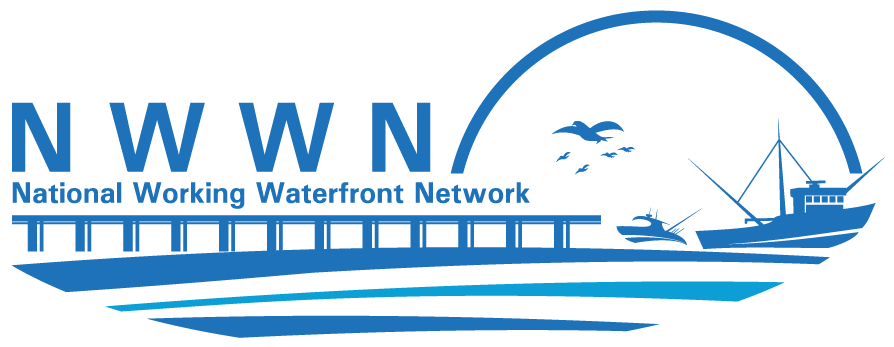
25 Oct National Working Waterfront Network Looks to Advance the Sustainability of Commercial Fishing Communities through Partnerships
FOR IMMEDIATE RELEASE
October 25, 2022
National Working Waterfront Network Looks to Advance the Sustainability of Commercial Fishing Communities through Partnerships
Commercial fishing communities range from large ports like New Bedford, MA and Dutch Harbor, AK to much smaller harbors consisting of a single small dock shared by commercial and recreational users alike. No matter the size, commercial fishing is often an important feature of the communities in which it exists, providing jobs, local seafood, and a connection to the waterfront and community’s past.
Despite their importance, commercial fishing communities face many challenges including impacts from climate change, a declining workforce, and competition for space along the shoreline.
Addressing these challenges requires a multi-disciplinary approach and is the goal of a new internship program offered by the National Working Waterfront Network (NWWN), a nationwide network of organizations committed to preserving and enhancing waterfronts and waterways.
Last year, with funding from the Walton Family Foundation and coordination provided by the Urban Harbors Institute at the University of Massachusetts Boston, the NWWN solicited research project ideas from community partners and paired those partners with graduate students able to help answer their questions. The interns presented their findings at the Network’s conference in Boston this past July. The first round of internships was a pilot program modeled after an internship collaboration between the five campuses of the University of Massachusetts system.
One NWWN intern from the University of Washington worked with Washington Sea Grant to assess the efficacy of an informal agreement between the coastal commercial Dungeness crab fishery and the tug/towboat industries on the western coast of the US to determine if it resulted in a reduction of potential conflicts between the two ocean users. The innovative agreement had been in place since 1971 but had never been evaluated. The research findings demonstrated overall compliance with the agreed-upon separation of crabber and tow/tug boat lanes and highlights this type of non-regulatory agreement as a way to promote collaboration between different types of ocean users.
A second internship, a partnership between the Massachusetts Division of Marnie Fisheries and the University of Massachusetts Amherst, explored the causes of declining participation in the summertime commercial fluke fishery off the Cape Cod region of Massachusetts despite an increase in available quota. The study, which involved gathering data directly from members of the fishing fleet, shed light on inadequate shoreside infrastructure—especially affordable dockage—as the primary obstacle to participation in the fishery.
The NWWN is preparing for the next round of these applied research internships and is currently seeking research questions from those involved in a variety of activities related to commercial fishing. “We see this internship program as a great way to both promote sustainable fishing communities and provide important research and job skills for the next generation of working waterfront professionals.” Notes Shannon Hogan, who oversees the internship program at the Urban Harbors Institute.
For more information about the internship program, including the current call for research projects, visit https://nationalworkingwaterfronts.com/about/internships/.
About the National Working Waterfront Network
The National Working Waterfront Network (NWWN) is a nationwide network of businesses, industry associations, nonprofits, local governments and communities, state and federal agencies, universities, Sea Grant programs, and individuals dedicated to supporting, preserving, and enhancing our nation’s working waterfronts and waterways. Participation in the NWWN is open to all individuals and organizations involved in working waterfront issues at the federal, state, and local level. Our mission is to increase the capacity of coastal communities and stakeholders to make informed decisions, balance diverse uses, ensure access, and plan for the future of their working waterfronts and waterways.
About the Urban Harbors Institute at UMass Boston
Founded in 1989, the Urban Harbors Institute (UHI), an institute within the School for the Environment at the University of Massachusetts Boston, advances ocean and coastal management through collaborative research and planning at the local, regional, state, federal, and international level. Working closely with governments, marine industry representatives, non-governmental organizations, and members of the public, UHI develops solutions to issues confronting coastal communities, marine-based industries, and activities, and reduces human impacts on the environment. Additionally, UHI’s position within the University of Massachusetts Boston allows the Institute to draw from the legal, economic, policy, and scientific expertise within the University.
###
MEDIA CONTACT:
Kristin Uiterwyk,
Director Urban Harbors Institute
Interim Chair, National Working Waterfront Network

